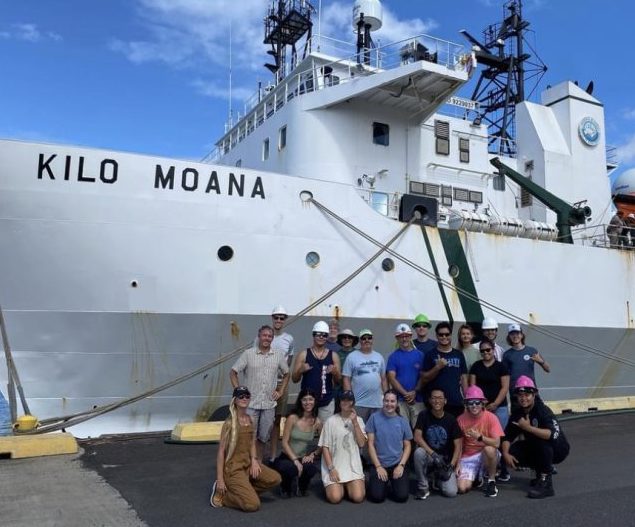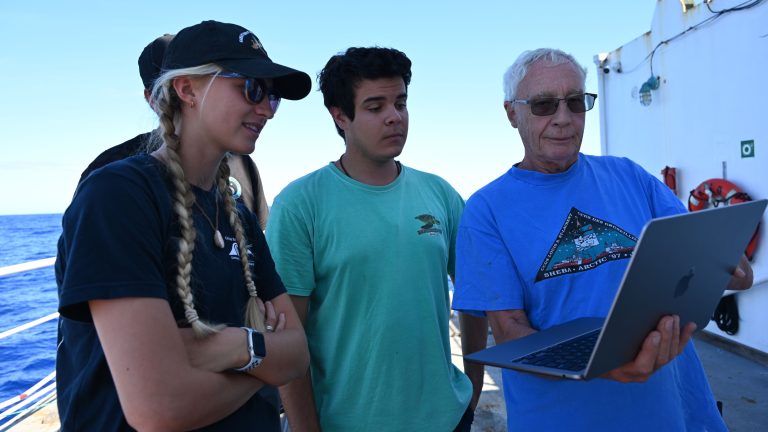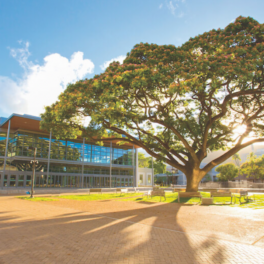Deep sea expedition provides inspiration, valuable skills for undergraduates
 Science party after the Hadal Profiler cruise, 2023. Credit: Stanley Lio.
Science party after the Hadal Profiler cruise, 2023. Credit: Stanley Lio.By participating in an oceanographic cruise aboard the research vessel (R/V) Kilo Moana recently, University of Hawai‘i (UH) at Mānoa undergraduate students in the Global Environmental Science (GES) bachelor’s degree program gained valuable experience and inspiration last fall. The mission of the expedition was to test and refine the performance of the Hadal Water Column Profiler, a unique scientific instrument designed to study the physical, chemical, and biological properties of the water in the deep-ocean trenches. Ocean depths greater than 6 kilometers are known as the hadal zone (after the Greek god of the underworld) and are among the most poorly studied regions on the planet.
“These deep ocean research cruises provides great opportunities for our students to engage in hands-on science, experience life at sea, and envision possible career paths—not just research scientists but also the engineers and ship’s crew that all work together to conduct successful at-sea observations,” said Glenn Carter, chief scientist of the Kilo Moana cruise in September 2023 and associate professor of oceanography at the UH Mānoa School of Ocean and Earth Science and Technology (SOEST).
Eight undergraduate and four graduate students joined physical oceanographer Carter and faculty members from the Department of Oceanography, including deep-sea biologist Jeff Drazen, chemical oceanographer Chris Measures, and biological oceanographer Craig Nelson for the four-day expedition two to 20 miles off O‘ahu’s Waianae Coast.

In addition to the hadal profiler testing, the team collected zooplankton (tiny, floating animals, such as krill) using net tows, and measured vertical profiles on water properties using a Conductivity-Temperature-Depth (CTD) sensor package. The CTD can also collect water samples from specific depths making it a workhorse of shipboard observational oceanography. Students assisted with or even led these efforts.
Applying classroom knowledge through hands-on experiences
The cruise was structured so that all the undergraduate students were able to assist or observe in all the various operations, including sorting zooplankton and analyzing the CTD water samples. The zooplankton and CTD data will be used to understand the effect of islands on the marine food web.
“The experience turned out to be far more than what I expected, in the best way possible,” said Mattia Da Fieno, GES student and cruise participant. “It was an incredible opportunity that both opened my eyes to how a lot of the scientific world works and let me put a lot of the skills I have been learning to good use.”

For many students pursuing degrees in ocean, earth or environmental sciences, working on the ocean or in the field is a dream come true.
“Going out to sea to do research has been one of my biggest dreams since I started college,” said Ande Westerhausen, GES student and cruise participant. “My most memorable experiences on the ship were the late nights processing zooplankton and bonding with my lab mates. Aboard the ship I quickly fell in love with the constantly busy environment where something is always going on.”
Networking and looking toward future careers
The first-hand experiences gained through these research cruises are also a powerful way for SOEST students to learn about the day-to-day life of an oceanographic researcher–providing a window into their possible future careers.
“This opportunity allowed me to live a handful of realistic days as an oceanographer–my dream job–and I loved every moment,” said Tyra Arends, GES student who grew up on both Oʻahu, Hawai‘i and Vancouver Island, Canada. “This experience gave me insightful fieldwork exposure, but most importantly, reassured me that I am chasing the right dream.”

“What I learned about myself throughout this cruise was that this type of work is definitely something that interests me far past what I had initially thought,” Da Fieno added. “It feels amazing to see the career I have always wanted since I was a little kid start to play out in front of me through opportunities like this.”
In addition to benefiting from the hands-on fieldwork, the students on the cruise also made connections with other students and researchers.
“The real value was found within the interactions on board,” said Arends. “As I plan to attend graduate school for oceanography, networking with potential mentors was vital as they provided me with wisdom and advice and I felt they truly took the time to get to know us as students and people.”
“This was truly an eye-opening experience that I wouldn’t trade for the world,” said Westerhausen.



